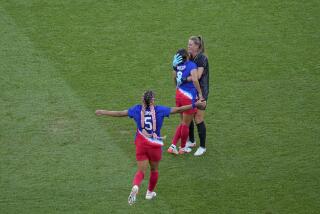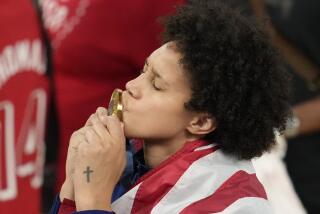Akers’ Gold Medal Is Worth the Wait
- Share via
ATHENS, Ga. — Michelle Akers tumbled on the turf in front of the vacant Chinese net, exulting in the Olympic gold-medal moment with teammate Tiffeny Milbrett, who earlier had scored the game-winning goal in the United States’ 2-1 victory over China.
Typically, Akers said later she wanted to reach out to a friend and teammate who had overcome adversity.
She could have been talking about herself.
Even as recently as last month, the athlete who was once called the greatest female soccer player in the world was not able to go 90 minutes. A foot injury limited her training, and Akers, 30, played only 28 minutes, and 74 minutes in successive tuneup games against Australia.
But there she was in the semifinals against Norway, tying the score on a penalty kick before the United States won in overtime. And there she was--on the field at the end Thursday anxiously waiting for injury time to expire. Waiting to exhale again, to enjoy the gold medal with her teammates and the 76,481 fans at Sanford Stadium, which is believed to be the largest crowd ever to see a women’s sporting event.
For Akers, a true pioneer of women’s soccer, the gold medal around her neck culminated years of waiting and cajoling for women’s soccer’s inclusion in the Games.
“I thought the game would never end,” Akers said. “The last few minutes took forever. I kept looking at the ref, looking at her watch. Blow it!”
Akers wasn’t the only American sweating out injury time.
“It was the longest half of my life; I think it was a 95-minute half,” goalkeeper Briana Scurry said. “I kept looking at the clock; it wasn’t moving.”
Finally, the medals were handed out, and Akers said she planned on keeping hers around her neck for some time, saying: “I’m sleeping in it tonight.”
So often the brilliant forward/midfielder has been called the Michael Jordan or Wayne Gretzky of her sport. She certainly has a dizzying array of credentials, as the United States’ all-time leading scorer. But Gretzky and Jordan never had to play through and deal with years of chronic fatigue syndrome, and play for years in front of small crowds where you know everyone on a first-name basis.
The daunting task of playing five games in a 12-day span certainly seemed formidable at the Olympics. She has dealt with the illness since 1993, and then suffered a knee injury and concussion in the first match of the women’s World Championship in 1995.
“It’s absolute relief,” Akers said. “It’s complete will for me to get through the tournament. For me to play 90 minutes four games in a row is a miracle. An athlete with chronic fatigue syndrome--and to play at this level--and achieve this is unheard of. . . . I’ve learned with chronic fatigue you have to limit the things you experience until you can enjoy the experience and expend the energy.”
The U.S. coaches, knowing her history of injury and illness, weren’t expecting anything specific from Akers. Anything she could contribute on the field was a bonus.
“Who would have thought this? Certainly not me,” Akers said. Akers made history by leading the United States to the first FIFA women’s World Championship in 1991 in China, scoring 10 goals, including five in one game. But the Olympic experience meant she was in rare company.
“To be an Olympic athlete puts you in an elite club for the rest of your life,” she said. “To be a gold medalist puts you in an elite, eliter category. It truly is a special, lifetime moment I will never forget.
What made it different, among other things, was the supportive American crowd. It was a festive, World Cup-type atmosphere.
Akers laughed when asked to compare this gold-medal aftermath to the reception the team received after the 1991 victory.
“Pardon me . . . hah, hah,” she said. “There were three people in the airport when we came home from China. And now we have 80,000 here celebrating our win. So many years we’ve dreamed of being the best in the world and that crowd acknowledged that dream.”
Like all great ones, Akers doesn’t want to stop competing for gold medals and World Championships. She will take two months off, hiking in the Cascades, and said on Thursday that she wants to play in the 1999 World Championship in the United States and the 2000 Olympics.
For her, it is simple.
“I really love playing this game,” Akers said, looking at the prized gold medal.
More to Read
Go beyond the scoreboard
Get the latest on L.A.'s teams in the daily Sports Report newsletter.
You may occasionally receive promotional content from the Los Angeles Times.







